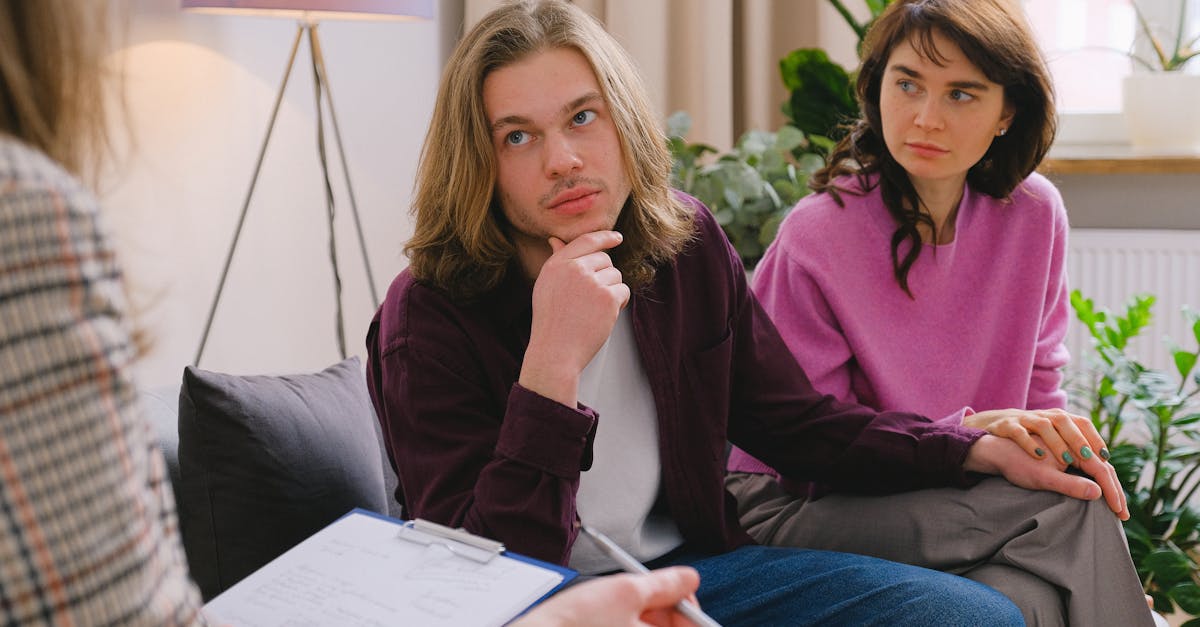
Common Issues Addressed in Therapy
Couples counseling frequently addresses issues stemming from communication breakdowns. Partners may struggle to articulate their feelings or needs effectively, leading to misunderstandings and resentment. Therapy offers a safe and structured environment for couples to improve their communication skills. Learning techniques to express emotions and listen actively can significantly enhance the quality of interactions within the relationship.
Conflict resolution is another common area explored in couples counseling. Disagreements are natural in any partnership, but how couples handle conflicts can shape their relationship's dynamics. Through therapy, partners can learn to approach conflicts constructively and negotiate differences without escalating tensions. Understanding each other's perspectives during disagreements fosters intimacy and reinforces the partnership’s resilience.
Identifying Relationship Challenges
Identifying relationship challenges is the first step in the couples counseling process. Couples often experience a variety of issues, including communication breakdowns, conflicts over finances, or differing life goals. These challenges can lead to feelings of frustration and helplessness. Therapists play a crucial role in helping partners pinpoint the root causes of these problems, facilitating a deeper understanding of each other's perspectives.
Many couples enter counseling with preconceived notions about the nature of their issues. Identifying relationship challenges requires openness to explore underlying emotions and patterns. Couples counseling provides a structured environment where partners can openly discuss their concerns. This safe space encourages honesty and vulnerability, essential components for developing healthier dynamics in a relationship.
The Impact of Cultural Factors
Cultural factors significantly influence relationship dynamics and the effectiveness of therapy. Different backgrounds bring varied expectations, communication styles, and conflict resolution strategies into a partnership. Understanding these cultural nuances is essential for therapists in couples counseling. They often need to create a space where each partner feels heard and validated in their unique experiences, ensuring that cultural identities are acknowledged and respected.
Incorporating cultural sensitivity into therapy can enhance the therapeutic process. Therapists may draw upon techniques and practices that resonate with a couple's cultural heritage. This approach can foster a greater connection between partners and facilitate more profound insights during sessions. By addressing the customs, traditions, and values that shape a couple's relationship, therapists can tailor their methods effectively, making couples counseling more impactful.
How Background Influences Therapy
Cultural background plays a significant role in shaping how couples perceive and approach relationships. Different cultures may have distinct beliefs about conflict resolution, communication styles, and emotional expression. These factors can influence how partners interact in therapy, as various backgrounds may lead to different expectations regarding roles within the relationship and how each partner should behave. Couples counseling must take these cultural nuances into consideration to be effective, creating a space where both partners feel understood and valued.
Additionally, individual family histories can further impact the dynamics of a relationship. For example, couples from backgrounds where conflict was avoided may struggle to express their feelings openly in therapy. Conversely, partners who grew up in environments with high levels of emotional expression may find it easier to share their thoughts. Couples counseling should address these individual histories, allowing therapists to tailor their approaches to fit the unique needs of each couple. Understanding these complexities enhances the therapeutic process, paving the way for deeper insights and healthier interactions.
Preparing for Therapy Sessions
Preparing for therapy sessions requires openness and willingness to engage in self-reflection. Couples counseling often brings up sensitive topics that can be challenging to navigate. Both partners should approach these sessions with a mindset geared towards understanding each other's perspectives. Setting aside any preconceived notions about therapy can help couples to be more receptive to the process and outcomes.
It’s beneficial for couples to discuss their expectations prior to starting therapy. Creating a list of specific issues or goals can provide a clear direction for the sessions. Being prepared to share thoughts and feelings openly fosters a safe environment, allowing both partners to express themselves without fear of judgment. Regular communication before and throughout the counseling process can strengthen the partnership and enhance the therapy experience.
What to Expect in Your First Session
Entering your first Couples Counseling session can feel daunting yet hopeful. Each partner may have different expectations or concerns, which makes open communication essential. The therapist will likely begin by creating a safe environment where both individuals can express their thoughts and feelings without judgment. Expect to discuss the dynamics of your relationship, the specific challenges you face, and your goals for therapy. This initial meeting sets the foundation for future discussions and deeper exploration.
During this session, the therapist may guide you through exercises designed to foster understanding and connection. They might ask questions that help unveil underlying issues contributing to your conflicts. Both of you will have the opportunity to share your perspectives and listen to each other. This active participation allows for greater insight into your relationship patterns, fostering a more constructive dialogue. Ultimately, this first session is crucial in establishing trust and collaboration in your Couples Counseling journey.
FAQS
What types of therapy are commonly recommended for couples?
Common types of therapy for couples include Emotionally Focused Therapy (EFT), Cognitive Behavioral Therapy (CBT), and Imago Relationship Therapy, each addressing different aspects of relationship dynamics.
How can I identify if my relationship needs therapy?
Signs that your relationship may need therapy include frequent conflicts, lack of communication, emotional disengagement, or difficulty resolving issues together. If you feel stuck or unable to move past certain challenges, therapy can be helpful.
What role do cultural factors play in couples therapy?
Cultural factors can greatly influence communication styles, conflict resolution, and relationship expectations. Therapists often consider these factors to ensure that the therapy process is culturally sensitive and effective for both partners.
What should I expect during my first couples therapy session?
During your first session, you can expect to discuss your relationship history, identify specific issues, and set goals for therapy. The therapist will facilitate open communication and help establish a safe space for both partners to express their feelings.
How can we prepare for our therapy sessions to get the most out of them?
To prepare for therapy, it's helpful to reflect on your relationship goals, be open to sharing your thoughts, and practice active listening. Coming in with a willingness to engage and work towards solutions can enhance the effectiveness of the sessions.
